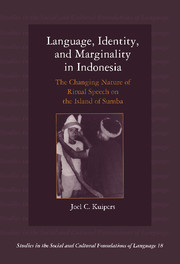 Language, Identity, and Marginality in Indonesia
Language, Identity, and Marginality in Indonesia Book contents
- Frontmatter
- Contents
- List of plates
- List of figures and tables
- Preface
- Acknowledgements
- Notes on orthography
- 1 Introduction
- 2 Place, identity, and the shifting forms of cultivated speech: a geography of marginality
- 3 Towering in rage and cowering in fear: emotion, self, and verbal expression in Sumba
- 4 Changing forms of political expression: the role of ideologies of audience completeness
- 5 Ideologies of personal naming and language shift
- 6 From miracles to classrooms: changing forms of erasure in the learning of ritual speech
- 7 Conclusions
- Notes
- Appendix
- References
- Index
- STUDIES IN THE SOCIAL AND CULTURAL FOUNDATIONS OF LANGUAGE
7 - Conclusions
Published online by Cambridge University Press: 05 July 2011
- Frontmatter
- Contents
- List of plates
- List of figures and tables
- Preface
- Acknowledgements
- Notes on orthography
- 1 Introduction
- 2 Place, identity, and the shifting forms of cultivated speech: a geography of marginality
- 3 Towering in rage and cowering in fear: emotion, self, and verbal expression in Sumba
- 4 Changing forms of political expression: the role of ideologies of audience completeness
- 5 Ideologies of personal naming and language shift
- 6 From miracles to classrooms: changing forms of erasure in the learning of ritual speech
- 7 Conclusions
- Notes
- Appendix
- References
- Index
- STUDIES IN THE SOCIAL AND CULTURAL FOUNDATIONS OF LANGUAGE
Summary
Languages do not just “up and die.” They do not grow old, wear out, get sick, decay, or rot. It is true that we speak of language mixing, borrowing, and code-switching, terms which seem to imply images of purity and pollution, wholeness and partiality, completeness and fragmentation. However, languages are not organisms with lives of their own, apart from the actors who use them. Languages – and the boundaries between them, their dialects, and their styles – are just as much “imagined” as the “Imagined Communities” that speak them (cf. Anderson 1991; see also Heryanto 1989).
An important point of this book is that languages differentiate, change, grow, decline, and expand not because of “natural” life cycles but because of the way that linguistic ideologies, held by interested actors and speakers and those who hold power over them, mediate between features of linguistic structure and socioeconomic relations. Ritual languages, special prestige registers, and respect languages – widely found throughout Indonesia – are a particularly good place to look for such ideologies, since they are the focus of some of the most strongly held beliefs about what language is for, why it exists, how it should be used, and how it should change or be preserved (see Adriani 1932; Fischer 1934; Fox 1988; Grimes and Maryott 1995; Kern 1913).
- Type
- Chapter
- Information
- Language, Identity, and Marginality in IndonesiaThe Changing Nature of Ritual Speech on the Island of Sumba, pp. 149 - 155Publisher: Cambridge University PressPrint publication year: 1998


